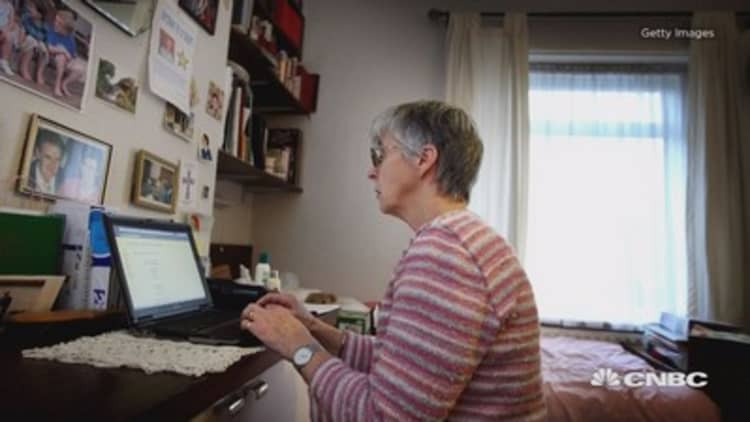Considering a donation to a 2016 presidential contender?
Before you do, think on this: Your cash may actually be worth more to a candidate than your vote. That's particularly true if your money goes toward increasing turnout in a contested state — and you aren't registered to vote in one.
"Money is fungible in a way that votes aren't," said Harvard political scientist and government professor Stephen Ansolabehere.
A hard question is how much, exactly, a single donation is worth. Some very rough estimates suggest it takes $40 on average to get a person to vote using traditional methods like canvassing, Ansolabehere said.



"If I give $200, that translates in some sense to five votes," he said, "But campaigns are like really inefficient nonprofits. A lot depends on how much they're spending on overhead, and the effectiveness of their methods."
Indeed, there's no magic formula to predict how much your cash will help. On average, current presidential candidates have spent about $10 for every popular vote they've earned to date, based on Federal Election Commission data and reported primary election results.
Of course, different campaigns see different "returns" on spending.
While Democrat Bernie Sanders has spent nearly $20 for every vote he's received in the primaries so far, Republican John Kasich has spent less than $4 per vote, according to FEC data.
But the relationship between campaign spending and success with voters can be loose — and unpredictable.
"How many votes a dollar buys will depend on all the myriad different ways in which that dollar can be spent," said John Sides, a George Washington University political science professor.
Moreover, high voter turnout isn't necessarily the sign of a well-run campaign, just as fewer votes per dollar spent isn't the sign of a poor one.
Donald Trump's success with voters, despite raising far less cash, and Jeb Bush's failure (before he dropped out) are evidence that the calculus is complicated, said Erika Franklin Fowler, a government professor at Wesleyan University.
"Trump is having to spend a lot less than is typical for a front-runner, partly because he gets so much free media coverage," Fowler said. "Jeb's case shows that if voters don't like what you're selling, no amount of spending will bring them over."
Some estimates suggest Trump has gotten nearly $2 billion worth of unpaid media exposure, more than the combined total for the four other remaining Republican and Democratic candidates.
Even when campaigns successfully influence opinions, actually getting people to vote can prove challenging. Slight variations in the way campaigns phrase their get-out-the-vote efforts can make a big difference in voter participation.
Campaigns don't even necessarily have to spend funds they have raised in order to affect outcomes, said University of San Diego political science professor Casey Dominguez. At least in legislative races, if an incumbent raises enough money, he or she may simply scare off competition, she said.
On the other hand, studies have shown that challengers get more voter "bang" for their campaign-spending buck than do incumbents, in part because lesser-known candidates have more to benefit from simply getting their name out.
One tricky part about drawing conclusions from existing research is that presidential races won't necessarily follow the same patterns as congressional or senatorial ones.
"Research suggests money makes a bigger difference when there is less money involved overall," said Brigham Young University political science professor Michael Jay Barber.
For context, President Barack Obama's campaign spent about 1½ times what Republican Mitt Romney's did in the 2012 election, totaling about $11 per vote versus Romney's $8. (If you include spending by PACs and national committees, the numbers are closer — and higher.)
Spending in 2016 is expected to only keep growing: Estimates suggest political advertising costs this cycle could top $11 billion, more than 20 percent higher than in 2012.
Now, if you see a campaign donation more as a show of support and less as a means to an end, you wouldn't be alone, Barber said. Millions of Americans have already contributed money to 2016 presidential campaigns, but few think about their gifts as a way to move the election.
"Generally the motive for individual voters donating is to support the candidate that shares their views," he said. "It's like going to a sporting event, where as a fan you won't make or break the outcome, but you still want to come out and participate."
But in a close election, every dollar can make a difference to a presidential hopeful, Dominguez said.
"You're keeping them in the race and helping them buy TV ads, pay consultants, buy pizza for the staff, everything," she said. "Money won't necessarily determine the outcome, but it will keep them in the game. If they run out of cash, they're out."
The power of small donors is apparent in Sanders' campaign, which has netted nearly $120 million, 80 percent of which has been from donations of less than $200.
One thing a donation won't get you? A tax break. Contributions to 501(c)(3) groups are tax-deductible, but those nonprofits aren't allowed to lobby for or support candidates for political office.


